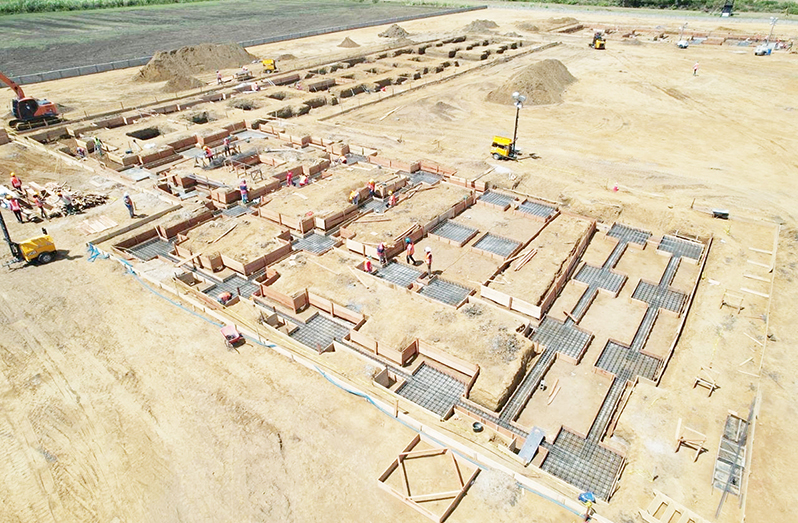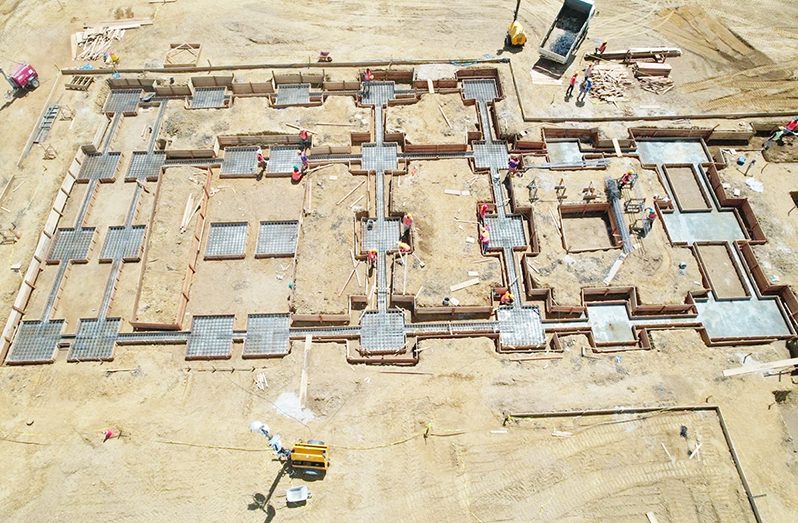— Professor Sankat says, emphasises magnitude of country’s Technical Training College’s role in driving this process
By Bebi Shafeah Oosman
THE construction of Guyana’s Technical Training College Inc at Port Mourant, Corentyne, Berbice, is advancing steadily and is on track to be fully completed by 2026. Once finished, this state-of-the-art facility will play a crucial role in providing world-class oil and gas training, not only to Guyana, but also to neighbouring countries.
The college is set to become a cornerstone of the region’s workforce development, equipping individuals with the skills and expertise needed to excel in the thriving energy sector. This initiative underscores Guyana’s commitment to building a skilled workforce that can meet the demands of its rapidly expanding oil and gas industry, while also fostering regional collaboration and growth.

Track one of the Oil and Gas Institute is funded by ExxonMobil, while Track two, the Hospitality and Tourism Institute, is currently under construction with funding from the government and the Caribbean Development Bank. Track three, the Port Mourant Training College, which falls under GuySuCo and the Ministry of Agriculture, is also set for further development.
In an exclusive interview with the Sunday Chronicle, Professor Clement K Sankat, Director of the Guyana Technical Training College Inc., stated that the work is progressing smoothly.
“We have been making a lot of progress, as you know this project began in 2022 with the decision of the President and the Vice President and they decided to create the Guyana Technical Training College in Berbice, Port Mourant, to be precise, right behind the GuySuCo Training College.”
According to Professor Sankat, “Since then it has really been nonstop planning and review, design, and then preparing for execution and in fact execution.”
The project after completion is estimated to cost over US $100M.
“I am not sure Berbice has seen such a development in a very small area like this… This is truly a massive project with really transformational ambitions.”
According to Professor Sankat, the intent was to create an oil and gas facility “to train the technicians to work on the FPSO.”
In February, President Irfaan Ali commissioned a US$13 million Facility Simulator (FACTOR) as part of the first phase of the Guyana Technical Training College Inc. This simulator is designed to train workers for offshore oil platforms. The first group of students graduated in July. Professor Sankat explained that students initially undergo 12 months of training in Canada before moving on to hands-on training at the Facility Simulator. Once the college is fully completed, the entire programme will be conducted on site. He hopes to begin classes by late 2025, with the remaining sections of the facility set to be fully completed by 2026.
“It is really a first unique facility in this part of the world and one that is likely going to be in demand for many years to come as more and more oil is discovered in the Atlantic waters outside of Guyana, outside of Suriname, outside of French Guiana. All the technicians who have to work on the production ships out there will need this kind of training, so down the road the future looks very, very bright for the FACTOR.”
Having accomplished construction of the factor, Professor Sankat noted, “We began the building of the main campus; remember the 12 months is being done in Canada. The intention is those 12 months will be done in the GTTC right here, so we are building the facilities to execute that.”
He added, “We hope by October next year, that the first phase of those facilities will be opened.”
The entire facility is expected to take over multiple acres of land, and Professor Sankat explained, “We had to do a lot of filling, compaction; we had to build retaining walls, we built a fencing.”
Stressing that the site was “beautifully prepared” for construction, he noted, “We had to build a bridge over the GuySuCo canal that was there into the site.
“All that has been done and now since the beginning of November, we have issued the contract to build the entire facility — all of it.”
The construction is being carried out by the local Berbice company, Raffik and Sons Construction.
Professor Sankat said, “The facility will consist of a classroom building, a laboratory and a workshop building and we are also hoping and planning to develop a programme in construction and project management, so that workshop and laboratory building is extensive and then we are building a residence for 100 students to live there and then we are building a student hall where they are going to use it for dining, etc.
“We could use it for other purposes when we have our assembly meetings or graduation ceremony, and then there is [sic] a lot of infrastructure walkways, parking lots and then, of course, the utilities. We have to put in electricity, water, cameras and all of that; the entire project is going to finish in October 2026.
“However in October 2025, we are going to take in our first batch of students here, we are going to use the classroom building and the workshop buildings and lab buildings and start our teachings, we are not going to wait.”
Professor Sankat emphasised that the government’s initiative to build this training facility showcases visionary leadership and a strong commitment to Guyana’s future and the wider region. He noted that this proactive approach not only meets the immediate demands of the growing oil and gas sector, but also promotes sustainable development through investment in education and skill-building. The initiative represents a long-term strategy to cultivate a well-trained, capable workforce that will drive economic growth, foster innovation and strengthen regional co-operation in the energy industry.
He said, “The intention of course for the Government of Guyana no doubt is one of building local capacity and down the road of reducing cost, because sending students away to train for 12-18 months, having cutting-edge training being done here is costly, but we are getting great value from it. We cannot compromise on the quality of our teaching and learning.”
He also assured that efforts are already underway to obtain international accreditation for the college, ensuring that the training provided meets the highest global standards. This commitment to world-class education will equip graduates with internationally recognised qualifications, boosting their career prospects. With a focus on excellence, the college aims to offer programmes that align with the best worldwide, positioning it as a leading institution for oil and gas training in the region.



.jpg)











